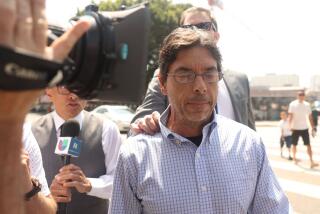Charges in Jackson case may not be filed until 2010, officials say
- Share via
Prosecutors and police investigators don’t expect to file charges in connection with Michael Jackson’s death before 2010, law enforcement officials told The Times.
The officials said there was so much evidence to review -- some of it complex medical data -- that they have sought the help of outside medical experts.
A decision on whether to file criminal charges is “months rather than weeks away,” one source said.
Jackson’s personal physician, Dr. Conrad Murray, who provided the pop star with the anesthetic propofol that coroner’s officials say killed the singer, has been identified in search warrants as a suspect in a manslaughter investigation and remains the focus of the probe.
The investigation has resulted in large quantities of information that need to be carefully reviewed not only by Los Angeles Police Department detectives but also by prosecutors and some outside medical advisors before a final decision can be made on how to proceed in the case, according to sources familiar with the investigation. They spoke to The Times on condition of anonymity because the investigation is ongoing.
With no suspects in custody, those familiar with the probe compare the Jackson case to the investigation of music producer Phil Spector, which took more than a year before prosecutors decided to file murder charges in the death of actress Lana Clarkson.
Murray has repeatedly denied any wrongdoing and insists that he gave appropriate medical aid when he found Jackson in distress and not breathing. His attorney has stressed that Murray is cooperating with authorities.
The Los Angeles County district attorney’s office has had Murray’s girlfriend, Nicole Alvarez, testify before a grand jury panel, according to sources.
The county coroner’s office determined that Jackson died from “acute propofol intoxication” combined with sedatives and declared his death a homicide.
The complexity of the medical evidence has led LAPD Robbery-Homicide Division detectives and a prosecutor who is working closely with them to seek several medical opinions in addition to the coroner’s officials’ on Jackson’s death, according to two sources.
Murray, 56, told detectives that he administered propofol and other medications to Jackson before the pop star’s death June 25, according to search warrants in the investigation. Five bottles of the anesthetic were purchased in Nevada from Applied Pharmacy by Murray, who had the drug shipped to California, according to search warrants in the investigation.
Some of those bottles were found in Jackson’s rented Holmby Hills mansion, according to search-warrant affidavits. Propofol is usually used in medical settings by medical professionals.
Murray told police that Jackson was dependent on propofol to sleep and that he was trying to wean the singer off the drug.
More to Read
Sign up for Essential California
The most important California stories and recommendations in your inbox every morning.
You may occasionally receive promotional content from the Los Angeles Times.










